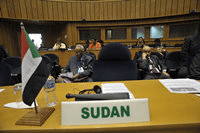NAIROBI, Kenya -- If you ask John Duku, South Sudan's outgoing envoy to crucial ally and neighbor, Kenya, the upcoming elections in Sudan are all but irrelevant to the future of Africa's largest country. The election represents the country's first multiparty ballot in 24 years, but for Duku, its outcome is a forgone conclusion and its fairness is already in question.
Nonetheless, the April polls just might loosen the grip that President Omar al-Bashir's National Congress Party has held on power through two civil wars and a series of internal skirmishes over the past two decades. The election comes at a critical point for Bashir himself, and will determine the president of the country, the president of South Sudan's semi-autonomous government, delegates to the National Assembly (as well as 25 state assemblies and the South Sudanese assembly), not to mention 25 governorships.
But with the threat of boycotts across the North -- including in the restive western region of Darfur -- and complaints about the fairness of the census that produced the voter rolls, neither Duku nor many others in the South are expecting the winds of change to blow across the White Nile.

